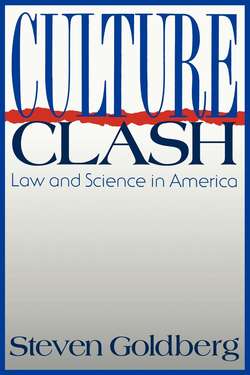Читать книгу Culture Clash - Steven Goldberg H. - Страница 10
На сайте Литреса книга снята с продажи.
TWO Lawyers and Scientists
ОглавлениеFor many years I have begun my law and science seminar by asking the students to write down the name of the most brilliant person who ever lived. I instruct them to write the first name that comes to mind using whatever definition of brilliance they like. I then collect their responses and read them aloud. They always fall into the same categories. Scientists predominate, led by Einstein and Newton, but Shakespeare and Mozart do rather well too. There is often a smattering of support for da Vinci, and I have seen occasional votes for Plato, Freud, and many others. There is one thing, however, of which I can be absolutely sure: No one ever names a lawyer—no Brandeis, no Mansfield, no Holmes, no Cardozo. My students are all in law school, so it cannot be from a lack of familiarity with great lawyers and jurists. Nor is this result limited to law students. I have asked the same question of scientists, musicians, and others, and the result is always the same. No one ever names a lawyer.
Having read aloud their responses, I ask the students why scientists are often thought to be brilliant but lawyers rarely are considered so. A few possibilities are quickly eliminated. It cannot be that there is one continuum of intelligence on which scientists rank higher. If that were so, a great scientist would inevitably make a great lawyer or judge—a proposition few are ready to support.1 Indeed, the occasional forays of scientists into other disciplines make it clear that for some, scientific ability implies very little about ability in other fields. Isaac Newton’s historical writings, for example, are something of an embarrassment to his admirers. Thus the biographer Edward Andrade, who regards Newton as “one of the greatest names in the history of human thought,” says of Newton’s Chronology of the Ancient Kingdoms Amended, “I am afraid no one reads it nowadays or would take it very seriously if they did. Newton thought that he could not be more than twenty years wrong with any of his dates: modern opinion is that he was often wrong by centuries.”2
Nor can it be that a scientist’s contributions are more individualistic or unique than a lawyer’s. On the contrary, an important feature of the history of science is the prevalence of simultaneous independent discovery. If one scientist had not made a breakthrough, often another would have, if not right away then perhaps within a decade or two. Einstein agreed with historians of science that the special theory of relativity was very much in the air among scientists at the beginning of the twentieth century; on the other hand, the role of the U.S Supreme Court was arguably shaped in a fundamental way by Chief Justice John Marshall in the early nineteenth century.3
